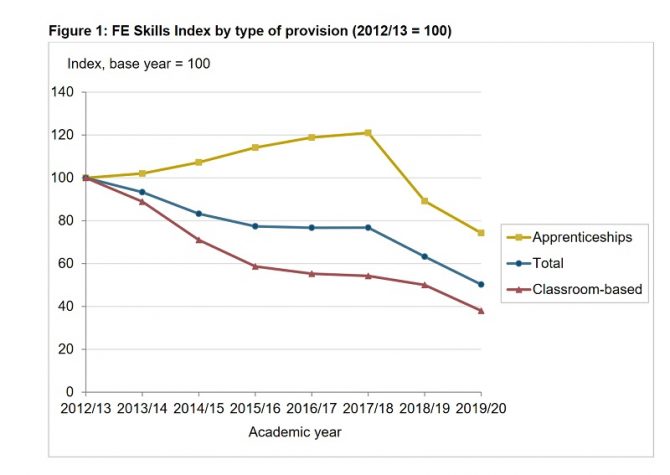The Department for Education has today published its final review of its apprenticeship reform programme.
Officials established the programme, which has seen the launch of the levy and introduction of standards among other changes, in 2015 and was scheduled to be delivered by the end of the financial year 2020-21.
Today’s report reveals the government’s progress against key performance measures such as its 3 million starts target, diversity goals and public sector apprenticeship objectives.
FE Week has pulled out the five main findings.
1) 3m target missed by 600,000 starts
In the 2015 manifesto, the Conservative Party set an ambitious target of 3 million apprenticeship starts between 2015 and 2020. A target they kept in the 2017 manifesto.
Since the apprenticeship reforms began in May 2015, by January 2021 there had been 2,373,100 starts, representing 79.10 per cent of target.
The DfE’s report says that while the 3 million target was missed by 626,900 starts, over the same period apprenticeships have “become of longer duration and are now co-designed with employers” meaning that the starts now made on the programme are “into higher-quality training”.
2) Diversity and inclusion targets met
The DfE set a target to increase the proportion of apprenticeships started by people of black, Asian and minority ethnic (BAME) backgrounds by 20 per cent by 2020. This would result in 12.1 per cent of starts being by apprentices of BAME backgrounds.
This was exceeded, reaching 13.3 per cent starts from people with BAME backgrounds by 2019/20, which is higher than the BAME employment rate of 11.7 per cent, according to today’s report.
The DfE also set a target to increase the proportion of apprenticeships started by those declaring a learning difficulty or disability (LDD). They aimed to increase LDD starts by 20 per cent, uplifting starts to 12.5 per cent.
This was achieved in 2019/20, with 12.5 per cent starts declaring an LDD, the report states.
3) ‘More to do’ on achievement rates
The achievement rate for apprenticeship standards sat at just 58.7 per cent in 2019/20.
While this is an 11.8 percentage point increase from 46.9 per cent in 2018/19, the DfE admits “we know there is more to do”.
Additionally, official government data published in March showed that just 60.2 per cent of apprentices training on new-style standards stayed on their programme until the end in 2019/20. This figure sat at 48.3 per cent the year before.
Skills minister Gillian Keegan told FE Week’s annual apprenticeship conference in April that she has ordered an investigation into the “astonishingly” high drop-out rate.
4) Skills Index for apprenticeships falls – again
The principal measure the DfE uses for monitoring productivity impact is the Further Education Skills Index.
The Index estimates the aggregate value of the skills supplied by the FE system each year by aggregating earnings returns for all adult learners and apprentices who successfully complete their courses.
For apprenticeships, the Index increased every year from 2012/13 to 2017/18 but fell by 26 per cent in 2018/19 and a further 17 per cent in 2019/20.

The DfE blames this recent decline on a “fall in participation, resulting in lower achievement volumes”. Activity in 2019/20 was also “impacted by Covid-19 restrictions, which led to an increase in breaks in learning and fewer achievements than expected”.
However, the average value-added of individual apprenticeships has increased each year, with each learner who completed an apprenticeship in 2019/20 generating 27 per cent more value than in 2012/13.
This has been driven by a shift from Intermediate towards advanced and higher apprenticeships, and towards sector subject areas associated with higher returns (engineering, construction, and ICT), the report says.
5) Public sector target missed
Public sector bodies in England with 250 or more staff have had a duty to aim to employ an average of at least 2.3 per cent of staff as new apprentices over the period 2017 to 2021.
Between that period, public sector employment of apprentices sat at an average of 1.7 per cent.
Following failure to hit the target and in “order to build on this success and continue to encourage public sector bodies to invest in apprenticeships”, the DfE has extended the public sector apprenticeships target for a further year from 1 April 2021 to 31 March 2022.









Sir Humphrey lives on!!!!!!!
John Thomas Ch.Eng., B.Sc.(Eng).
Managing Director.
A disgrace. Less than 60% And T-Levels will equally have a terrible pass rate but Skills and Education ministers still look to drive out BTECs and other functioning successful AGQ and Occupational qualifications for their blinkered socially reducing prospective dead end qualifications.
86% of college leaders voted to keep AGQs following a prolonged consultation period and yet the 3 A Level equivalents are slated to be removed starting 2023.
Learners will have only 2 choices at Level 3. A-Level or Technical (T-Level)
Unlike apprenticeships T levels will not be required to pay 16 year olds for the 2 days a week in the workplace nor the 3 days in college. So given the findings where there is more than 60% failure rate on Apprenticeship programs which reward learners with pay and a potential job at the end of the course, why do we continue to persist with the flawed vision of the Skills and Education Ministers when it is clear these courses do not work.
About time Ministers listened and acted on those who understand post 16 education best.